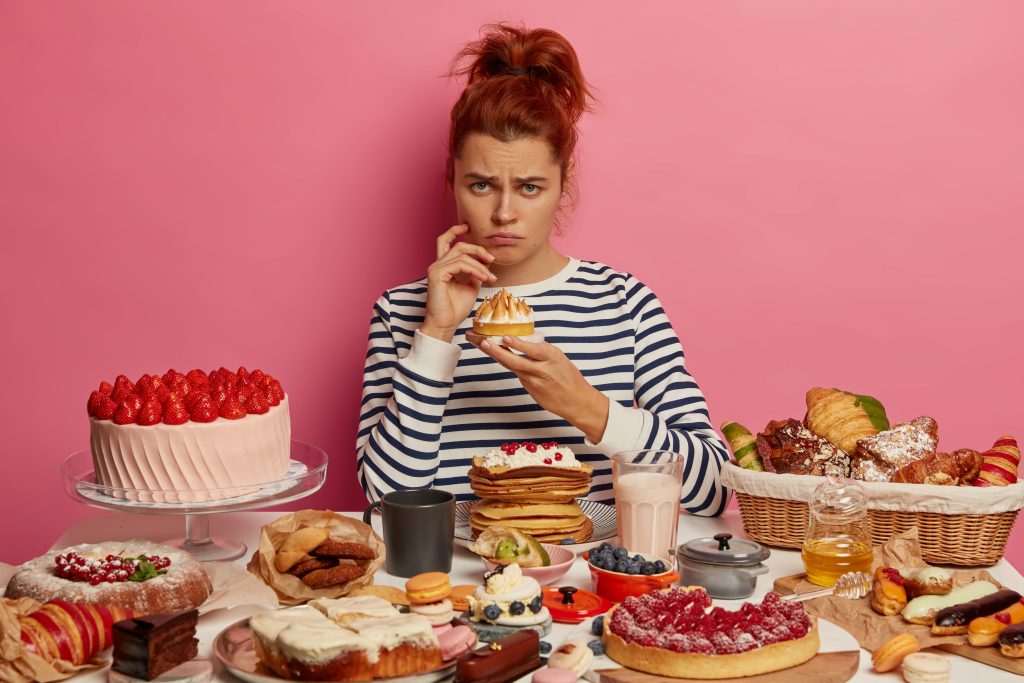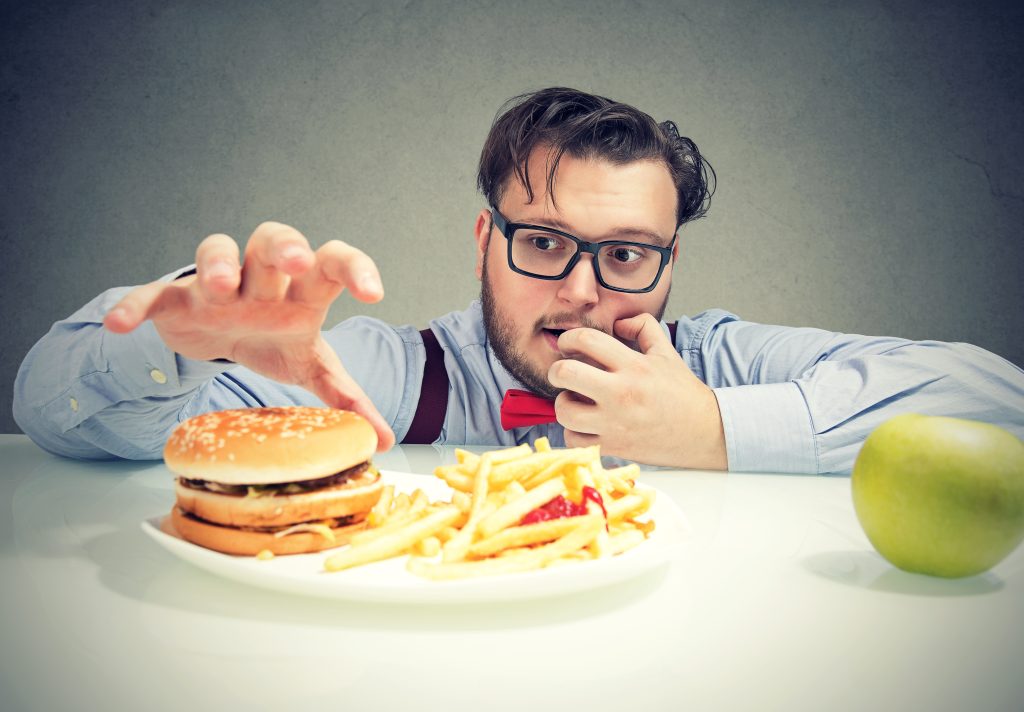
How do you get over an addiction to food?
You’re Not Addicted to Food
To be clear, you can’t have an addiction to food. Or if you do, you also have an addiction to air, too. Unlike alcohol, drugs, gambling, and a few other things people become addicted to, you actually need food to survive. Which in many ways makes changing your relationship to food harder than kicking addictions to things you can simply abstain from completely, the way that alcoholics, drug addicts, or gamblers can from their addictions.
Addiction to Burgers
So, let’s agree that you aren’t addicted to food because you do need to eat. What you may be addicted to, possibly, is junk food or (the behavior of) overeating.
Using a standard definition of addiction, which is “Addiction involves craving for something intensely, loss of control over its use, and continuing involvement with it despite adverse consequences,” let’s say you could be addicted to burgers. You crave burgers intensely, you experience a loss of control around burgers, and you continue to eat burgers (or too many burgers) despite adverse consequences.
Before I get to what you have to do to change your relationship to burgers and stop being addicted to them, I’d like to tell you a story about addiction.
The Great Binky Challenge
Our daughter was two and a half when we first took her to the dentist for the first time. When we got there, she had her pacifier in her mouth. right there for the dentist to see.
I saw the look on his face and asked, all innocent-like, “When do you think we should think about taking her binky away?” And he looked down at his watch and then smiled at me. So, now? Yesterday? Maybe we should never have given her a pacifier in the first place? Whatever, it meant that we were going to need to take away the binky soon.
So, in the spirit of full disclosure, we told our daughter it was time to stop using her binky because the dentist said it would be bad for her teeth and mouth. She didn’t care. She was two and a half. She wanted her binky.
At first, my husband and I thought we’d be able to make it so unpleasant to have the binky that she would stop using it on her own (personal empowerment!), so we put that nasty-tasting liquid on it that you buy for kids who are sucking their thumbs. But she’d just put the foul-tasting binky in her mouth, would make a face, take it out, then put it back in, make a face, take it out…over and over, becoming increasingly distressed because having something wrong with her binky was somehow worse than not having it at all, apparently.
We felt so bad for her, but realized there was going to be no easy way out of this for any of us. We decided to finally stop giving her access to any binkies. Yes, one day we gathered them all up and put them in a paper bag and hid them away. We didn’t tell her that the “binky fairy” took them to give to the new babies. We owned up that it was us and told her it was simply THAT time…time she had to stop using the binky.
Her eyes grew wide and filled with tears and she looked up at me and said something I will never forget as long as I live:
“But Mommy, it’s the only thing that makes me happy!”
We were about to take away the “only thing” that made our little girl happy (according to her). She was pretty convincing and we almost believed her. If my husband and I hadn’t been there to support each other through this, one of us would have buckled and given in. I’m not going to say who.
But we were a team! That evening at bedtime we put two sleeping bags on the floor beside her little toddler bed and gave her her favorite stuffed animal and said that he would be there for her and we were going to be there for her and that it was alright to be sad that she couldn’t have her binky anymore, but it was going to be okay.
But it wasn’t okay.
Not for several nights. About a week of nights, in fact. She cried herself to sleep, and then slept fitfully, with us right there beside her. Sleeping fitfully. She tried sucking her thumb (which I also worried about) but that just wasn’t the same as her binky, and she didn’t take to it. She held our hands. She slapped our hands away. And she pleaded and cried and was so, so, so sad.
And then one night she wasn’t as sad anymore. One night she didn’t even ask for her binky. It had actually become okay to not have it. She could fall asleep with just her stuffed animal and didn’t need us on the floor beside her. Yay mattresses!
The reason for telling this story isn’t because burgers are like binkies. Although maybe Freud would try to make the case about parallel oral fixations or something. It’s because the key to kicking an addiction happened here.
The Key to Ending An Addiction
My Clinical Psychology Ph.D. specialty is in Addictions and I’ve worked with people with eating disorders for 25 years and what I can tell you is this: the one thing you have to be able to do in order to successfully kick an addiction is accept that you are going to be sad that you can’t have the “only thing that makes you happy.” Until eventually other things are able to make you happy.
Of course, ending an addiction is a complicated process, but this is the key ingredient. You can have support, detox, treatment, self-help groups, and therapy, but without this, it won’t work.
Smokers who decide to quit smoking go out and put a lollipop in their mouths instead of a cigarette as a replacement behavior for smoking. Does the lollipop make them happy? Hell, no! Or they take a 10-minute walk instead of smoking. Does that make them happy? Nope. Ask one. They’d rather have a smoke break.
Alcoholics who decide to become sober might drink water when they meet their friends after work, instead of wine. Does the water make them happy? Happier than the wine would? Hell, no! Water is not alcohol. Never has been, never will be.
If you’re addicted to burgers and you decide that instead of eating burgers, you’re going to substitute a nice salad or veggie burger every time you have a craving for a burger, is that going to make you happy? If you crave burgers and are addicted to them, you already know the answer to that. (Hell, no!)
It’s So Sad to Say Goodbye
We don’t get addicted to things that don’t do something for us. They make us happy. Help us forget. Help us manage stress. Calm our nervous systems. Excite our nervous systems. We don’t get addicted to things that don’t do something for us that we like, at least, initially.
Once the negative effects of drinking too much, gambling away your paycheck, or eating too many burgers kick in, we may make a different decision about whether it’s doing something good for us. It might even be doing something good for us and bad to us at the same time.
If you want to stop being addicted to burgers, you have to stop eating burgers. You have to do something besides eating burgers. This is all the “Duh!” stuff you already know. But in addition to doing something besides eating burgers, you have to accept that nothing is going to scratch your burger itch like eating a burger and if you’re off of eating burgers, then you’re going to be bummed about that. For a while.
Until eventually you’re only just a little wistfully sad about not eating burgers, instead of all-consumed about it. You might be one of those people who can eat burgers someday in the future without losing control around them. That can happen with some addictions. Some people can learn to eat burgers responsibly!
In the beginning, you’re going to crave burgers, think about burgers, plot and plan how to get burgers, and more than likely cave at some point and eat a burger and feel bad that you gave in to your addiction that you were trying to kick. Or not. But if you choose to eat a burger over feeling sad that you’ve decided not to eat burgers anymore, you can’t lose the addiction.
You Gotta Wanna

If you are giving up eating burgers because your doctor or your mother or your husband or your mirror told you to, you won’t be able to stop eating burgers. If you are giving up eating burgers because you OUGHT to, you SHOULD, it would be GOOD for you, or you NEED to for blah, blah, blah reasons…forget it. It won’t work.
The only way you can successfully give up eating burgers is because you have decided that you WANT to stop eating burgers and you are GOING to stop eating burgers. Period.. You’ll have your reasons, but they need to be your reasons. Most importantly, you have to accept, commit, embrace, prepare for, and somehow get support if you need it to survive the loss of this thing that has made you happy at least some of the time. At least one time. Or most of the time. Or all the time. It may be the only thing that makes you happy right now.
You have to be okay with nothing being able to do for you what burgers do for you. For a while. Maybe it’ll be for a short time. Maybe once you stop eating burgers, you won’t miss them. Maybe you’ll wonder why you ever liked them or ate them. Maybe you will miss them and crave them a little bit forever. Maybe even when other things have taken the place of burgers in your life and they make you happy, maybe you’ll have to concede that nothing quite does for you what a burger used to do. And that will be sad. But you’ll be okay with that. Really okay or mostly okay, but okay.
A year or so after the Great Binky Challenge, our daughter found the paper bag of binkies when we were doing some spring cleaning. And she was surprised and happy and she kept them, for old times’ sake. She was far too old by then to use binkies anymore., but not too old to appreciate what they had once meant to her.
Kind of like how you may someday feel driving past In ‘N Out someday. You know those burgers are in there. You remember how good they were. You remember how much they made you happy. How one time they were the only thing that made you happy. But things are different now. And you just don’t need them anymore.
Dr. Anita Sanz, PhD, Psychologist
Read more about addiction:
How Addiction Hijacks the Brain
How Food Addiction Works (and What to do About it)
